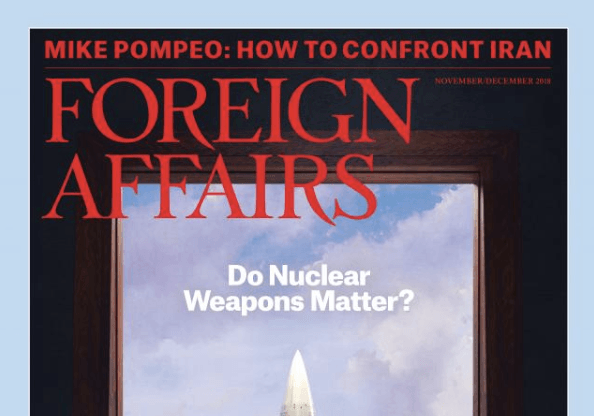Does “Foreign Affairs” matter?
By John Mecklin | October 22, 2018

Well, of course Foreign Affairs—the venerable, distinguished, and habitually high-quality magazine published by the Council on Foreign Relations—matters. It’s a must-read for anyone with a serious interest in international relations, within or outside the government. But it’s usual excellence doesn’t mean that (to use baseball terminology) every time Foreign Affairs throws a pitch, the result is a strike, as is made clear in the lead article in the magazine’s current issue, titled “Nuclear Weapons Don’t Matter/But Nuclear Hysteria Does.”
The article, authored by John Mueller, an adjunct professor of Political Science and Woody Hayes Senior Research Scientist at Ohio State University and a Senior Fellow at the Cato Institute, contends … well, let me provide an extended quote, so what he contends is presented in full context:
Since the 1940s, nuclear weapons have greatly affected defense budgets, political and military posturing, and academic theory. Beyond that, however, their practical significance has been vastly exaggerated by both critics and supporters. Nuclear weapons were not necessary to deter a third world war. They have proved useless militarily; in fact, their primary use has been to stoke the national ego or to posture against real or imagined threats. Few states have or want them, and they seem to be out of reach for terrorists. Their impact on international affairs has been minor compared with the sums and words expended on them.
The costs resulting from the nuclear weapons obsession have been huge. To hold its own in a snarling contest with the Soviet Union during the Cold War, the United States spent $5–$10 trillion maintaining a vast nuclear arsenal—resources that could have been used more productively on almost anything else. To head off the imagined dangers that would result from nuclear proliferation, Washington and its allies have imposed devastating economic sanctions on countries such as Iraq and North Korea, and even launched a war of aggression—sorry, “preemption”—that killed more people than did the nuclear bombs dropped on Hiroshima and Nagasaki.
The time has long since come to acknowledge that the thinkers of the early nuclear age were mistaken in believing that the world had been made anew. In retrospect, they overestimated the importance of the nuclear revolution and the delicacy of the balance of terror. This spurred generations of officials to worry more about nuclear matters than they should have and to distort foreign and security policies in unfortunate ways. Today’s policymakers don’t have to repeat the same mistakes, and everybody would be better off if they didn’t.
This thesis—that too much attention has been paid to nuclear weapons; the security policy elites of the world should put their concerns about them on a back burner and focus on more important matters—is clearly presented, and it introduces a large, potentially interesting idea. What’s truly, clearly interesting, though, is not so much Mueller’s piece but the rest of the issue, which is given over to articles that, without directly confronting Mueller, argue that he is just plain drastically wrong. (To be clear, I think he’s dead wrong, too.)
In a genuinely distinguished piece, Stanford’s Scott Sagan contends that in addition to possible US-Russian nuclear war and terrorist use of an improvised nuclear device, the world now faces a third major nuclear danger: the rise of what he calls personalist dictatorships in states that possess or could acquire the bomb, i.e. countries like North Korea. “These dictatorships differ from other autocratic governments because their leaders have such dominant personal power that other state institutions—such as parties, politburos, or military officers—cannot overrule the decisions made at the top. Personalist dictators can make decisions on a whim, which creates a grave challenge to the concept of nuclear stability,” Sagan writes. “The world has faced this particular nuclear danger only once before: between 1949 and 1953, when Joseph Stalin enjoyed unchallenged personal dominion over a nuclear-armed Soviet Union.”
But if a proliferation of Stalinesque leaders in new nuclear countries doesn’t matter to you, perhaps the headline of a piece by Georgetown University’s Caitlin Talmadge—”Beijing’s Nuclear Option/Why a U.S.-Chinese War Could Spiral Out of Control”—just might.
And so the issue goes: A cover with the provocative headline: “Do Nuclear Weapons Matter?” A lead story that asserts they don’t, with the author declaiming that Einstein and Churchill were wrong—and he is right—about the importance of nuclear arms. And then five articles by esteemed experts who provide an amazing litany of reasons why the lead story is way, way off the mark.
For me, reading the issue felt something like watching one of those Russian car crash video compilations, in which dash cameras capture one abrupt and vigorous collision after another. But no need to view the issue through my lens. I am after all editor in chief of the Bulletin of the Atomic Scientists; one might expect me to think nuclear weapons matter. You can experience the issue yourself, via these links, which take you through the Foreign Affairs paywall for at least the next few weeks.
| “Nuclear Weapons Don’t Matter” by John Mueller |
| “How Disarmament Fell Apart” by Nina Tannenwald |
| “If You Want Peace, Prepare for Nuclear War” by Elbridge Colby |
| “When Dictators Get the Bomb” by Scott D. Sagan |
| “Beijing’s Nuclear Option” by Caitlin Talmadge |
| “Moscow’s Nuclear Enigma” by Olga Oliker |
Publication Name: Foreign Affairs
To read what we're reading, click here
Together, we make the world safer.
The Bulletin elevates expert voices above the noise. But as an independent nonprofit organization, our operations depend on the support of readers like you. Help us continue to deliver quality journalism that holds leaders accountable. Your support of our work at any level is important. In return, we promise our coverage will be understandable, influential, vigilant, solution-oriented, and fair-minded. Together we can make a difference.
Keywords: Council on Foreign Relations, Foreign Affairs magazine
Topics: Nuclear Risk, Nuclear Weapons, What We’re Reading














